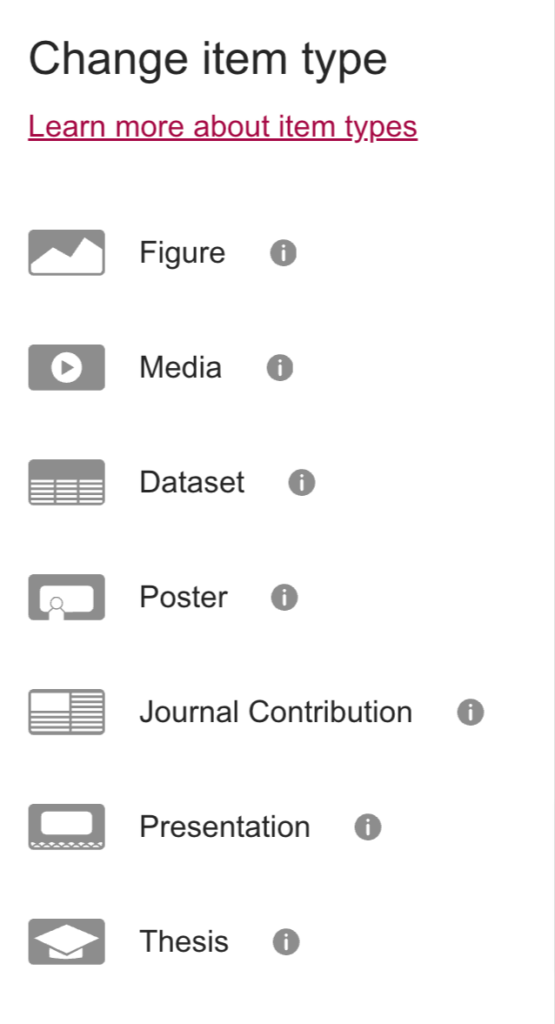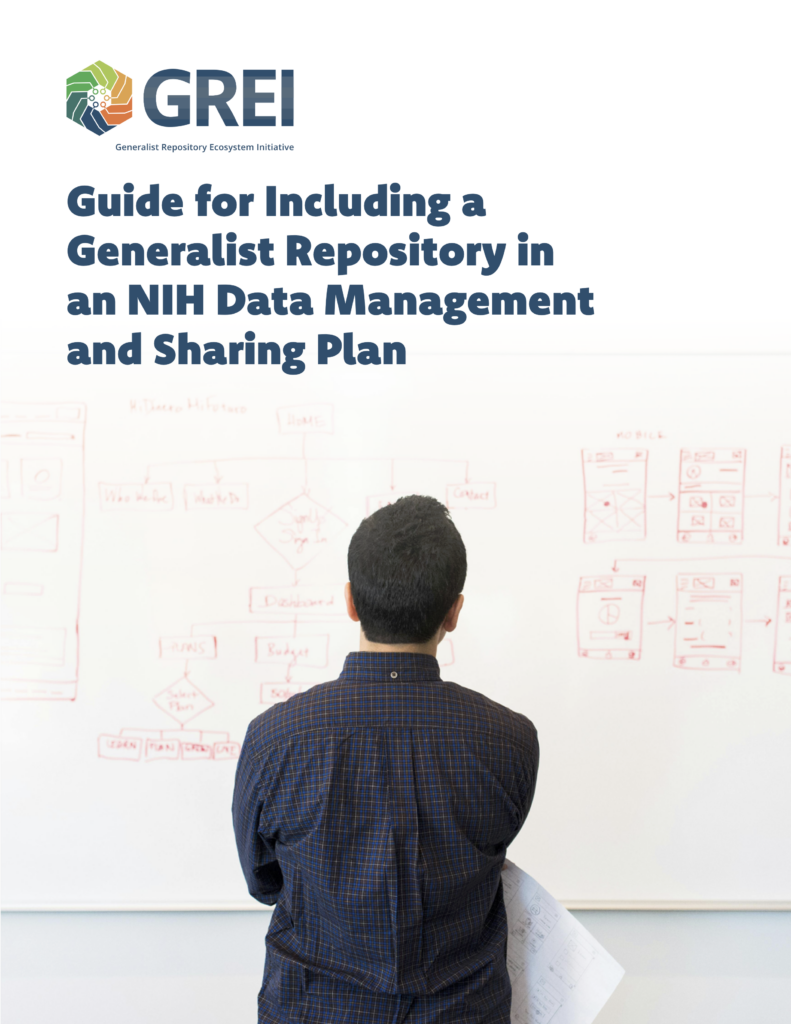Written by Lisa Curtin and Ana Van Gulick
The Generalist Repository Ecosystem Initiative (GREI), an ongoing NIH Office of Data Science Strategy-sponsored program, has entered its fourth year. GREI has brought Figshare together with 6 other generalist repositories (Dataverse, Dryad, OSF, Mendeley Data, Vivli, & Zenodo) to work towards establishing common standards for an interoperable generalist repository landscape and to develop resources for the research community. This recap highlights Figshare’s GREI Year 3 accomplishments, building on previous updates from Year 1 and Year 2.
Figshare Product Enhancements
The GREI repositories have collaboratively defined best practices for metadata, search features, metrics, and repository workflows to support NIH research use cases. Figshare continues to implement product enhancements aligned with these standards to enhance research transparency and reproducibility. Key projects in Year 3 included:
DataCite Usage Tracker implementation
We implemented DataCite’s configurable tracking script on dataset DOI landing pages across figshare.com and Figshare Plus. This aligns with the COUNTER Code of Practice for Research Data and prepares for a DataCite Commons dashboard tracking usage statistics for NIH-funded datasets across all participating generalist repositories.
FAIR Signposting Level 1 tagging
To improve machine navigation, we implemented the FAIR Signposting Level 1 specification by adding standardized HTML <link> elements to Figshare item pages, enhancing interoperability with other GREI repositories and scholarly communication infrastructure.
Metadata restructure and enhancements
We continued our long-term metadata restructure project in Year 3, completing scoping and assessments to develop a plan for implementing Item type-based metadata. This will enhance metadata and persistent identifier functionality, aligning Figshare with GREI best practices and supporting a variety of different item types that are shared in Figshare. As part of this project, we explored the feasibility of and potential designs for additional GREI-related metadata sub-projects, including funding metadata user interface enhancements to improve metadata quality and the implementation of file-level metadata.

Collaborative Work
GREI’s “coopetition” model of working fosters trust and collaboration among the seven repositories. This model drives progress towards both individual product enhancements and the collective development of best practices for data sharing and reuse that would not have been possible otherwise.
Use cases development
We expanded our use case catalogs with institutional and researcher examples. New institutional use cases show how generalist repositories can power institutional repositories or support multi-repository approaches. New researcher use cases detail approaches to big data sharing. Figshare’s full set of GREI use cases is available here.
White papers for alignment on definitions and opportunities
We collaboratively developed an AI Taxonomy to highlight potential positive impacts across the data lifecycle, supporting repository managers both within GREI and beyond in spotting AI-related opportunities and anticipating challenges that may arise. We also published a definition of big data in generalist repositories to outline the meaning of the term specifically within the flexible, discipline-general context of GREI repositories.
Improving interoperability and agreeing on common standards
Much of the collaborative work of Year 3 continues in Year 4; in Year 3 we initiated or moved into new phases of work on complex projects including cross-repository search, consistent metrics across GREI repositories, and refinement of the GREI metadata recommendation based on the DataCite metadata schema. We look forward to sharing more about these efforts over the course of the year.
Outreach & Resources
As in previous years, Figshare continued to take a leading role in the development and delivery of collaborative outreach activities and resources, and we continued to provide GREI-related data sharing resources and webinars to the Figshare community as well.
GREI outreach activities
- Led content development for the GREI community blog, contextualizing our collaborative efforts for a wider audience.
- Organized and anchored GREI webinars, including both GREI-driven and community-partner led sessions.
- Contributed to the organization and judging of the 2024 DataWorks! Challenge; 82 teams submitted proposals for impactful secondary data analysis research projects, and 10 teams have been selected to advance to Phase 2.
- Co-led the development of new resources for the research community: the Guide for Including a Generalist Repository in an NIH Data Management and Sharing Plan and Best Practices for Data Submission in Generalist Repositories: A Checklist.
- Represented GREI in sessions at workshops & conference presentations throughout the year, including the RDA 23rd Plenary Meeting, FORCE2024, Open Repositories 2024, and Medical Libraries Association 2024.
Figshare resources & webinars
- Updated US funder data sharing policy compliance guides following the launch of the new Figshare website.
- Presented GREI-related Figshare webinars: NIH data sharing and discovery in Figshare (June 2024), Back to basics: Figshare tools and workflows for efficiently publishing research (September 2024), and Introducing Figshare’s metadata restructure project (February 2025).
- Highlighted Figshare’s GREI outcomes in a presentation at the Figshare North America user meeting in June 2024.
Looking ahead to Year 4
Year 4 of the GREI program is underway. Having previously led the GREI working group in Year 2, Ana Van Gulick, Head of Customer Engagement for Government, Funders, and Nonprofits at Digital Science and a Co-PI of Figshare’s GREI award, is again co-chairing, this time alongside Julie Wood (Vivli). Ana and Julie are providing strategic guidance and program management in collaboration with the NIH Program team, organizing collaborative meetings, and facilitating the execution of the working group’s annual plan to support the success and impact of GREI.
At Figshare, our Year 4 GREI work continues the ongoing product enhancement projects described above, with completing the implementation of item-type based metadata as a cornerstone of our effort. The transformation to item-type based metadata will incorporate additional development work related to fulfilling GREI best practices, including continued scoping, assessment, and potential implementation of funding metadata user interface enhancements, file-level metadata, and integration of ROR identifiers.
With the GREI working group, we continue to collaborate across both technical and outreach activities in response to research community needs, including engagement with Figshare users to understand their use of Figshare and the impact of data sharing and reuse on their research. In Year 4, we especially look forward to working with community partners on metadata, metrics, and search efforts:
- Collaborating with community partners Metadata Game Changers and DataCite to assess metadata quality and completeness.
- Working with DataCite to develop an all-GREI cross-repository dashboard capturing NIH-funded dataset usage metrics.
- Leveraging existing community search tools (DataCite Commons, NLM Dataset Catalog) to facilitate more comprehensive cross-repository discovery of datasets.
Figshare’s commitment to the initiative remains strong; in addition to Ana’s working group leadership, Lisa Curtin, Figshare’s coordinator for research data & funders, and Mark Hahnel, the founder of Figshare and VP of Open Research at Digital Science, are also taking leadership roles in various collaborative projects and community outreach activities.
We look forward to continuing our collaborative work with NIH and the other GREI repositories to enhance metadata standards, improve interoperability, and develop new resources, all in service of the goal of a more efficient, transparent, and interoperable research ecosystem.


